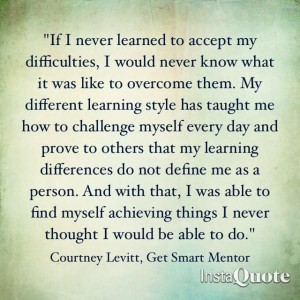 Growing up, I questioned my “stupidity.” I felt dumb and embarrassed. I couldn’t understand why I was still reading through the instructions when my classmates were already halfway done with the actual assignment. I couldn’t fathom why my classmates would voluntarily read out loud in front of the class at times when it wasn’t even obligatory – I could barely even articulate a sentence without having to awkwardly pause because I lost track of the word I was on. I couldn’t grasp how my friends were able to get by in school without even opening a textbook, whereas I would spend countless hours outside of class revisiting and re-teaching myself the day’s lesson, in addition to the night’s homework assignment.
Growing up, I questioned my “stupidity.” I felt dumb and embarrassed. I couldn’t understand why I was still reading through the instructions when my classmates were already halfway done with the actual assignment. I couldn’t fathom why my classmates would voluntarily read out loud in front of the class at times when it wasn’t even obligatory – I could barely even articulate a sentence without having to awkwardly pause because I lost track of the word I was on. I couldn’t grasp how my friends were able to get by in school without even opening a textbook, whereas I would spend countless hours outside of class revisiting and re-teaching myself the day’s lesson, in addition to the night’s homework assignment.
When it came to school, every day was a constant struggle for me. There, I was forced to face a battle each day and result in the same defeat. I always found myself lacking noticeably behind everyone else in school, and I’m not just talking about in gym class. In fact, gym class was one of the only places I felt sane, knowing it would be ok if I came in last place; it didn’t faze me. I’ve always considered myself a pretty uncoordinated person, so I never saw the point in trying to prove myself any differently when it came to gym class. Although it would be pretty cool to be able to shoot a three-pointer, or even run a mile without stopping because of a ghastly cramp, I never held these things against me too harshly. In gym class, my mindset was always to give it my best and have fun (oh, and of course avoid sweating at all measures).
Unfortunately, this was not the mindset I had going into my other classes. Rather, it was quite the opposite. When it came to assignments, tests/quizzes, readings, and any other academic related endeavor, I always found myself struggling to finish the task in time. I was consistently the last one to drop down the pen, the last one to leave class, and the only one who was unable to complete the assignment when the time was up. It seemed to come easy for everyone else, except for me.
The thought of anything that had a time constraint on it petrified me. It wasn’t a matter of not knowing the material or not wanting to participate in the activity; it was something no one, not even myself, could provide reasoning for at the time. And because of this, people would refer to me as dumb, unintelligent, sluggish, brainless, and other offensive words, lowering my self-esteem and making me believe I really was all of those things. I knew that there were times where I would make dim-witted comments, but I didn’t want to believe that was what was separating me from everyone else in class. Nothing made sense to me for a while, but it wasn’t long before I was able to find reasoning behind why I was feeling this way whenever I was in school.
When I found out I had learning differences at the age of 10, a part of me wanted to give up. I felt like I had been diagnosed as a failure and the thought of going back to school felt like a punishment. I always knew there was something separating me from my other classmates, and it took me a while to understand that my different learning style actually played a huge part in my struggle with school.
I got along great with my classmates, had plenty of friends, but for some reason, I still felt so alone in all of this. I was nervous about what my friends would say, what my classmates would think of me, and how my teachers would treat me, knowing I had a learning disability. I hated the attention and didn’t want to be considered any different than anyone else.
My parents knew how much I was struggling in school and how much I dreaded going back each day. I spent far more time on the Internet, searching ways to make sense out of my assignments, than focusing on the assignment itself. I thought that the anxiety that I woke up to every morning and the nonstop apprehension that I felt every day in class was a common routine for many students. However, my parents overly stressed to me that school isn’t supposed to make me feel like this; it’s supposed to be a comfortable environment where I’m excited to learn. I told them I didn’t feel any excitement, I only felt down. Eventually, I realized that my parents were right after all, and maybe switching to a school that better suited my learning style would be a better experience for me.
It took me a while to realize that not everyone learns in the same way, and not every school fits everyone’s learning style; it’s a matter of finding the proper fit for yourself. When I transferred schools in middle school, I felt on top of the world and finally felt like I could be myself. I was able to enjoy my classes for once, bond with my teachers, and even have classmates that had similar learning styles as me. There, every student had a unique learning style and every teacher was accommodating toward him or her. No one was considered dissimilar; everyone had a learning difference, making everyone, in a way, equivalent to each other. It was comforting to know that I wasn’t alone anymore.
To this day, others may question why I receive double time on my assignments, or why I’m allowed to use a laptop during class when electronics are prohibited, but what no one will ever understand are the obstacles that I had to overcome to get to where I stand today. It took me time to overcome my struggles and realize that my learning differences do not define me as a person. It took me time to feel equal to everyone else in my classes and to not feel ashamed of my dissimilarities. There were times I wanted to give up and refused to believe that I could ever succeed, but I was determined to put forth the effort and prove to others that despite my disability, I have just as much potential to achieve as they do.
 Even today, I pride myself with my learning differences and even claim that I am granted “extended time” for life. When my friends are frustrated with me for taking too long to get ready, I’ll say something along the lines of, “I have extended time, give me five more minutes to finish doing my hair.”
Even today, I pride myself with my learning differences and even claim that I am granted “extended time” for life. When my friends are frustrated with me for taking too long to get ready, I’ll say something along the lines of, “I have extended time, give me five more minutes to finish doing my hair.”
If I never learned to accept my difficulties, I would never know what it was like to overcome them. My different learning style has taught me how to challenge myself every day and prove to others that my learning differences do not define me as a person. And with that, I was able to find myself achieving things I never thought I would be able to do.
__________________________________________________________________________________________








Leave A Comment